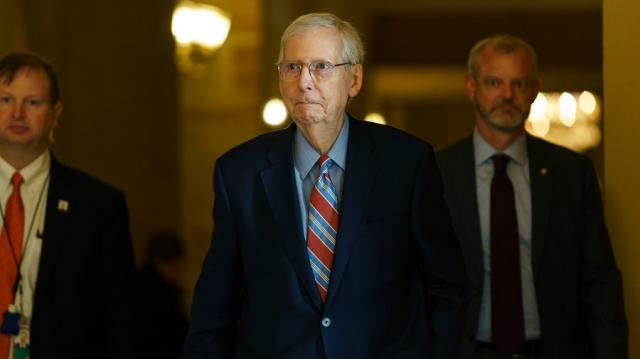Senate Republican Leader Mitch McConnell (Ky.) warned Senate Democrats on Tuesday about issuing subpoenas to two prominent billionaires and a conservative activist because of their friendly ties to conservative members of the Supreme Court, calling such a move “totally inappropriate.”
McConnell essentially told Democratic colleagues to back off after Senate Judiciary Committee Chairman Dick Durbin (D-Ill.) announced this week that his committee will subpoena two businessmen who extended personal hospitality to conservative Justices Clarence Thomas and Samuel Alito.
“What he’s targeting here is private citizens with no legislative purpose. I think it’s completely and totally inappropriate,” McConnell said at a press conference Tuesday.
Durbin and Sen. Sheldon Whitehouse (D-R.I.), the chairman of the Senate Judiciary Subcommittee on the Federal Courts, announced Monday that the Senate Judiciary Committee will vote to authorize subpoenas for billionaire real estate magnate Harlan Crow and mortgage company owner Robin Arkley II, who provided hospitality to Thomas and Alito, according to media reports.
ProPublica reported in April that Crow had treated Thomas to luxury vacations for more than 20 years and then reported in June that Arkley received Alito as a guest at his luxury fishing lodge in the Alaska wilderness.
Durbin announced the committee will also issue a subpoena for Leonard Leo, the Federalist Society leader, who went on vacation with Thomas at Crow’s Camp Topridge resort in the Adirondacks, and who helped organize Alito’s fishing vacation in Alaska.
A painting at the private lakeside resort shows Crow, Leo and Thomas smoking cigars together in a relaxed outdoor setting.
Durbin said on the Senate floor Tuesday that the subpoenas are “the next step in the committee’s ongoing investigation of the ethics of the Supreme Court.”
“It only comes after Mr. Crow refused to comply with committee requests and Mr. Leo and Arkley stonewalled the committee,” he said.
Durbin told The Hill that he expects to have enough Democratic votes in committee to approve the subpoenas.
Durbin and Whitehouse defended the use of subpoenas to compel cooperation with their panel’s investigation into the Supreme Court’s ethics in a joint statement.
They argued that there aren’t any other steps for the committee to consider other than a “compulsory process” because of what they characterized as the outright defiance of legitimate oversight requests.
They noted the Judiciary Committee in July advanced the Supreme Court Ethics, Recusal and Transparency Act, a bill to require Supreme Court Justices to adopt a code of conduct.





